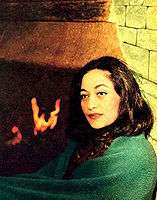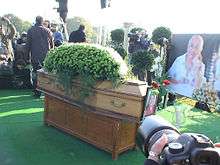Marzieh (singer)
| Marzieh (مرضیه) | |
|---|---|
 | |
| Background information | |
| Birth name | Ashraf o-Sadat Mortezaie |
| Also known as | Marzieh |
| Born |
22 March 1924 Tehran, Iran |
| Died |
12 October 2010 (aged 86) Paris, France |
| Genres |
Classical Folk Traditional |
| Occupation(s) | Singer |
| Years active | 1942–1979; 1994–2010 |
| Labels |
Caltex Records Pars Video Avang Records |
Ashraf o-Sadat Mortezaie (1924 – 13 October 2010), known professionally as Marzieh, was a Tehran-born singer of Persian traditional music.[1]
Career
Marzieh started her career in the 1940s at Radio Tehran and cooperated with some of the greatest 20th century Persian songwriters and lyricists like Ali Tajvidi, Parviz Yahaghi, Homayoun Khorram, Rahim Moeini Kermanshahi and Bijan Taraghi. Marzieh also sang with the Farabi Orchestre, conducted by Morteza Hannaneh, a pioneer of Persian polyphonic music, during the 1960s and 1970s. Her first major public performance was in 1942, when, though still a teenager, she played the principal role of Shirin at the Jame Barbud opera house in the Persian operetta Shirin and Farhad.[2]
Following the Islamic Revolution of 1979 public performances and broadcasts of record albums by solo female singers were banned outright for ten years. Ayatollah Khomeini had decreed: "Women's voices should not be heard by men other than members of their own families."[2]
She told the Daily Telegraph that in order to continue her vocal practice she used to walk by night from her home in the historic north-Tehran Niavaran foothills to her cabin in the mountains, where she would sing next to a roaring waterfall: "Nobody could hear me. I sang to the stars and the rocks."[3]
Upon the death of Khomeini the successor mullahs suggested that she could resume singing, provided that she undertook never to sing for men. She refused, declaring, "I have always sung only for all Iranians," and in 1994, she left Iran forever due to the political repression, making her new home in Paris.[3]
She performed several concerts in Los Angeles, California and Royal Albert Hall (London) in 1993, 1994 and 1995. The Paris-based composer Mohammad Shams and the Persian tar soloist Hamid Reza Taherzadeh were the main musicians who worked with Marzieh in exile.
France 3, a regional TV news and entertainment channel, has compared Marzieh's singing voice to those of legendary songstresses Édith Piaf and Maria Callas.[4] On the other hand, the European press have also compared her to Vanessa Redgrave and Melina Mercouri for her willingness to put political and human-rights beliefs ahead of her career, even her own safety.[2]
Death

Marzieh died of cancer in Paris on 13 October 2010, aged 86.[1][5] Maryam Rajavi, one of the leaders of an Iranian opposition group, delivered her eulogy: "Marzieh was the symbol of protest and revolt in Iranian art against the fascism of velayat-e faqih (absolute clerical rule).... Hail to Marzieh; the great, brave and pious woman who 16 years ago joined the Iranian Resistance and offered her complete support and compassion, and, in so doing, blended art with the love for freedom and the magnum opus of human qualities."[6]

References
- 1 2 Adam Bernstein, "Persian songstress a voice of Iranian political dissent," Washington Post, 15 October 2010. Accessed 26 October 2010
- 1 2 3 Trevor Mostyn, "Marzieh obituary", The Guardian, 19 October 2010, Accessed 26 October 2010.
- 1 2 "Diva defied Iran's Mullahs", Daily Telegraph, 21 October 2010. Accessed 26 October 2010
- ↑ "French TV covers Iranian singer Marzieh's Funeral", National Council of Resistance of Iran, 20 October 2010. Accessed 26 October 2010
- ↑ Margalit Fox,"Marzieh, Iranian Singer and Voice of Dissent, Dies at 86", New York Times, 16 October 2010. Accessed 26 October 2010
- ↑ Maryam Rajavi, "Message of Mrs. Rajavi". 13 October 2010. Accessed 26 October 2010
External links
- Marzieh's songs @ Radio Golchin
- Marzieh's Songs and Albums
- Marzieh concert at Royal Albert Hall, conducted by Mohammad Shams, 1993 on YouTube
- Fans website of Marzieh
- Marzieh Songs and lyrics in Persian
- Marzieh Passes Away in Exile (Iranian.com, in English)
- Radio Farda Interview with Marzieh's grand daughter (in Persian)
- Diva of Persian music passes away (Swedish Friends of Free Iran / FOFI)
- (Marzieh in Music Obituaries by Telegraph)